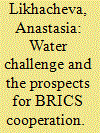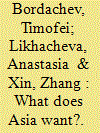|
|
|
Sort Order |
|
|
|
Items / Page
|
|
|
|
|
|
|
| Srl | Item |
| 1 |
ID:
100620


|
|
|
| 2 |
ID:
147038


|
|
|
|
|
| Summary/Abstract |
In early May, a week apart, Russia's Minister of Agriculture Alexander Tkachev and presidential economic advisor Sergei Glazyev spoke of exporting Russian fresh water. The minister came out with a radical proposal to export surplus water from hydroelectric power plants in the Altai region to Chinas Xinjiang via Kazakhstan. Glazyev took a more market-oriented approach. He proposed "collecting, purifying, treating and exporting fresh water." In former years, Moscow's ex-mayor Yuri Luzhkov also proposed exporting Russia's water resources, and in 2013 the Economic Development Ministry considered the idea, too. Now this idea has emerged in a different context, but its essence is the same--to get a lot of money without making much effort by selling natural resources that cost nothing to the country.
|
|
|
|
|
|
|
|
|
|
|
|
|
|
|
|
| 3 |
ID:
170683


|
|
|
|
|
| Summary/Abstract |
Brazil and Russia rank first and second globally by the amount of renewable freshwater resources. Despite the significant challenges to municipal water use and water quality for the population, even in the timespan of 30 years these countries will be most protected from water stress. At the same time, China and India - countries with vast water resources, meet growing water challenges being the first and second in terms of world population and the world’s first and third economy according to PPP with prospects for further growth. South Africa is the flagship of BRICS on the African continent - the water-deficient country that is mostly affected by the physical shortage of water resources. This article aims to systematize possible areas of deepening cooperation in BRICS through the water agenda. It seems necessary to firstly assess the significance of the water factor for the member-states, than to characterize the current level of dialogue and applied interaction on water issues in BRICS. Secondly, the article compares international approaches to the water problem and, based on this, in the third part, analyzes the possibilities of BRICS to develop cooperation through the water agenda. As a result, the article concludes that, despite the objective physical prerequisites for water dialogue in BRICS as a strategic direction for the development of an organization, the formats that have emerged today clearly consider water cooperation in a rather limited aspect. The article suggests that the perspectives associated with a comprehensive agenda must be built on nexus concepts like water-food-energy-climate-sustainability nexus etc. Virtual water and the exchange of water technologies, and the creation of common water-technology clusters deserve a special place on the agenda as well as specially designed programmes by the BRICS New Development Bank.
|
|
|
|
|
|
|
|
|
|
|
|
|
|
|
|
| 4 |
ID:
138218


|
|
|
|
|
| Summary/Abstract |
Over the years since the 1998 crisis, the so-called Emerging and Developing Asia has become a new engine of global economic growth. The region has been developing under the slogan "Asia for the world," and the world has been looking for opportunities that it could draw from the Asian economic miracle. Today we are witnessing a profound transformation of the existing model: almost all countries in the region are becoming more Asiacentric, and a new model is emerging that can be called "Asia for Asia." It seems to be a perfect time to ask: What does Asia want? And does this mean that Asian economies will be able to catch up with the best standards of quality that the local growing consumerist class is looking for?
|
|
|
|
|
|
|
|
|
|
|
|
|
|
|
|
|
|
|
|
|